Rejtélyes hálószobai fotó: nem az a legnagyobb kérdés, lesz-e pornó
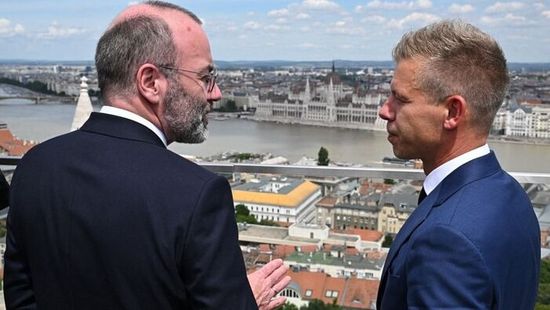
Mután Magyar Péter elismerte, hogy részt vett a drogos házibulin, nagy nyomás nehezedett Magyarországra – mutatott rá az elemző.

The chargé d'affaires told Mandiner that there are former or current public officials in many countries within the EU who are not permitted in the U.S., but they and their governments never made this information public. Mr. Goodfriend also talked about the incoming ambassador, the visit to Mr. Bitó's salon, and whether the U.S. can understand the special Hungarian interests in Ukraine.
We have seen news in recent days about the possible arrival of the new ambassador, Ms. Colleen Bell, and how it will affect your position. What do you expect, when is she coming?
The Senate is scheduled to vote on “cloture” on the 1st of December. On the 2nd of December, if everything goes well, as we expect, she would be confirmed and then she will be preparing after that to come here, so there is no fixed day, I imagine sometime in January.
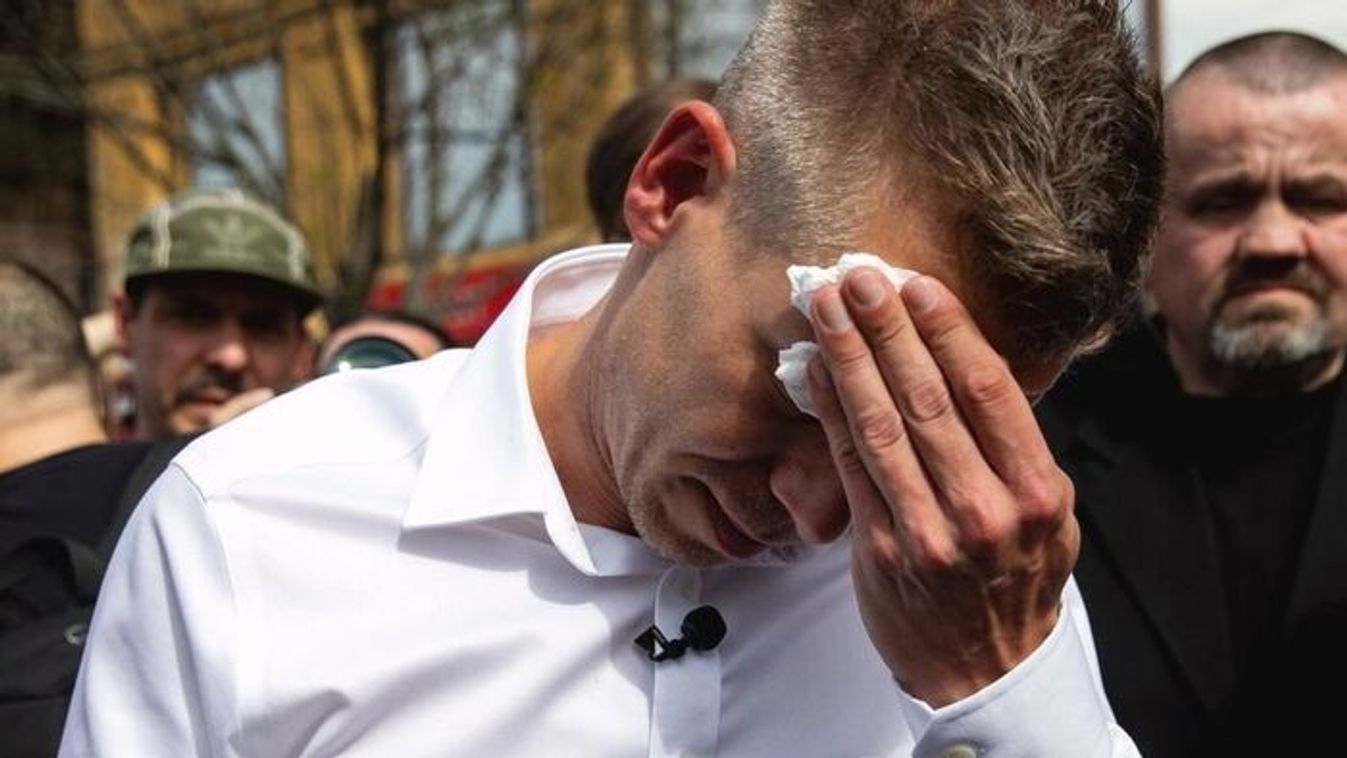
What happens if the Senate will not support Ms. Bell?
It would be unusual, but things would continue as they happen.
Would it mean that a new process starts with a new candidate? I mean, is it the last chance for Ms. Bell?
It would be very unusual, extremely unusual, not to be confirmed. But it's possible. If they choose not to confirm that would be an assessment. That would be something that is hard to speculate about. Usually what happens if the Senate is not inclined to agree to a candidate, they won't schedule the vote. The leader of the Senate is aware of what the feelings are in the Senate. Generally something like this won't be scheduled unless it looks like there is going to be a confirmation. Because if there is any question about whether there would be a confirmation, they would postpone scheduling the vote. So given that the vote is on the calendar, there is only a small possibility that she wouldn't be confirmed. But it's possible. Nothing is impossible.
What happens when the new ambassador arrives? Will you continue serving as a deputy?
I would be the deputy chief of the mission, which is what I was assigned to be but have not yet had the opportunity yet, because when I arrived in August, we were already without an ambassador – Ambassador Kounalakis left in July. So this would be the opportunity to do what I was sent here to do.
Can you see any reasons why the State Department could decide to call you back? I mean two possible reasons: One, if the Hungarian government sends such messages to the US administration that such a step could help cooperation between our two countries. The other: you have become quite well-known in Hungary – a quasi-political celebrity or something like that. It can be a strange situation for an incoming ambassador to also have a semi-ambassador who is more famous in Hungarian politics than herself.
We work together as a team. We can’t not do our work because there is no ambassador. We can't say that, as long as there is no ambassador here that we have to not discuss policy, not talk to media and keep everything quiet. So what I've been doing are all things that my government wants me to do. They’re the things I believe in, as well. And the fact that there is this large discussion taking place here shows that perhaps these are things that are important to talk about. And when the ambassador arrives, she'll be a part of this discussion as well. So it shouldn't be about personalities. It shouldn't be about me or anybody else, we are talking about issues. It’s about shared values between our societies, working together constructively as allies, as partners, and how we further and improve that relationship. What kind of societies do we want in the future? I've been having that discussion now. When the ambassador comes, she will be able to join that discussion and lead that discussion.
Was Ms. Kounalakis still an ambassador when you arrived?
She left in July, and I arrived in August. I studied Hungarian for a year before arriving here, and I came here in March 2013 to practice speaking Hungarian, and I met with Ambassador Kounalakis then. We’ve corresponded since then. She also came back to Hungary when we gave back the Táncsics Mihály property.
Is it usual for a chargé d'affaires to keep in touch with the former ambassador?
I've met with almost all the ambassadors that have been here since Ambassador Blinken. I've met with Ambassador Blinken, I’ve met with Ambassador Brinker, I've met with Ambassador Foley, I’ve met with Ambassador Walker, I've met with Ambassador Kounalakis.
Is that a continuous contact or is it occasional?
It's occasional. It's a matter of people who are familiar with the situation, who have worked here in this position before, and of me valuing the expertise and experience of others. That's why I talk with them and with Hungarians here. Hungarians who are in the current government. Hungarians who have been in previous governments, former Hungarian ambassadors, and the whole range ... I mean each person has their perspective and their experience and it’s valuable for me to understand it.
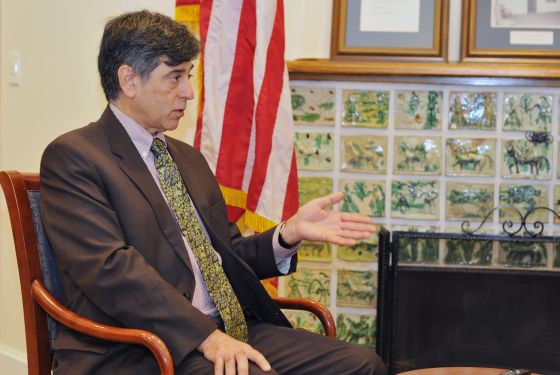
How do people working for the American foreign service see the practice of political nominees? Do they have any problems with it?
There was a very public discussion about this last year and in the beginning of this year. [The discussion was] with regard to career diplomats and non-career diplomats or ambassadors, but also with regard to the qualifications of anybody who is going to be the president's representative as an ambassador. That political nominees should meet the same criteria as career diplomats with regard to the ability to convey the U.S. government's policy convincingly at senior levels, with the ability to supervise the functioning of an embassy. Each area -- whether career diplomats who have served 15 to 20 years in the State Department, or non-career ambassadors who have built their careers in private industry, in the public sector, among the NGO community, or in a range of professions -- each of us brings a different type of expertise and professionalism. One of the things that makes our diplomatic corps and our ambassadors as vibrant as they are, as representative of the United States as they are, is that we do take from different segments of society. We don't have only career bureaucrats, but we have people from the outside who come with a different perspective that keeps us alive and diverse.
But most of these political appointees are not politicians, but donors of presidential campaigns.
Well, they're not actually donors themselves. Most of them are not reaching into their own pocket.
Some of them are donors, some of them are fundraisers.
And there’s a big difference there. What diplomats do is trying to convince people about a perspective: to explain why something is important. To be able to explain that this is something we believe in and we would like you to believe in it too, and let me tell you why it's important. And if you think it's important, we think you should support it as well. That's what a fundraiser does. That’s what somebody who is able to talk about a political campaign and say that I believe that the policy of this administration or this presidential candidate is important. I'm supporting this presidential candidate, you should as well, and we would like you to contribute to this campaign. If you think about what an ambassador does where we talk about the policies of the U.S. and how we work together as countries, and that we should support common principles. We support these things, let me explain them to you. We’d like you to support them as well. That’s a good skill for a person to have.
It's true for fundraisers, but for donors...
Most of them are actually fundraisers. Those who do have the resources themselves, there are also ... we're talking about some standard criteria, some qualifications. If a person does happen to have worked and made enough money to be able to provide their own support to a candidate, what is it that that person has done? Are they an entrepreneur? Are they someone who has risen in business and who understands the corporate world and could help further our interests in commerce as we talk about trade agreements, someone who understands the international business climate, who understands the international monetary environment, somebody who should also have the ability to discuss corporate finance, how companies work together, what type of international policies might benefit corporation cooperation and intergovernmental cooperation, and should also be able to work with a staff, to work with the people that would support them…
So, according to the U.S. public, it's in no way some kind of corruption?
Not really. It is a system where money is involved in that respect. And whenever there is money involved, people talk about it. Is there an actual exchange of this for that? That's why it's important to have regulations, it's important to talk about the criteria, it's important to make sure that there are no conflicts of interest and to have the process be as transparent as possible. Because whenever somebody obtains any type of benefit, people will ask “how do they get that?” People will want to speculate about that. That's why transparency, good accountability are important, as well as a process where we can show that the person really is qualified for the position that they're getting.
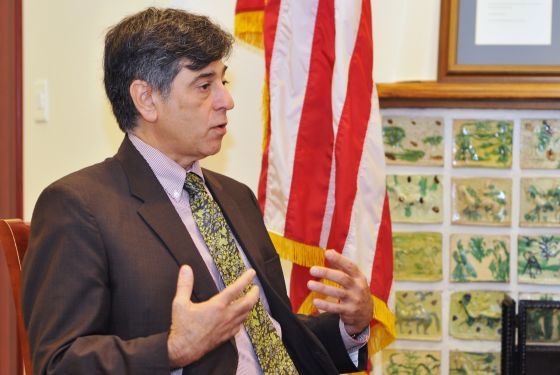
What do you see as the key topics nowadays in American-Hungarian relations? What are the most important ones?
Well, right now, there are several. One is looking at what's happening in Ukraine -- how do you work together with regard to countering the separatist movements there and ensuring that there is stability, territorial integrity in Ukraine, which is neighboring Hungary. So working as allies together within the EU and with the United States trying to ensure that Russia is not able to destabilize the situation further. Other issues … Trade. We are trying to ensure that we have a trade environment where we can have common standards in trade between the United States and the EU. It's easier to increase the markets for Hungarian products, for European products and for American products, within an environment where people can be assured that we have common standards. This is what we're talking about with the Transatlantic Trade and Investment Partnership (TTIP). And we also work together in a military relationship as well. We're working together as a NATO Ally. We count on Hungary, and Hungary generally does step up to the plate with regard to supporting NATO operations, working as a good Ally, whether in the Middle East, whether in the Balkans, and now again as we're looking at what's happening in Ukraine.
Can the U.S. understand and respect Hungary's special position in Ukraine? There is a Hungarian minority that usually gets the same from Ukraine's government as the much bigger Russian minority.
Yes, the short answer is yes. I think we do understand Hungary's positions with regard to ethnic minorities, Hungarian minorities in neighboring countries, including Ukraine. We discussed this with the government of Hungary and this is an EU discussion as well. How are the ethnic rights within Ukraine preserved? How are the rights of ethnic communities within the EU preserved?
But there is a weird situation that Ukraine's pro-Western elite is not really a pro-minority elite. The pro-Western parties are sometimes nationalistic, sometimes anti-Semitic, anti-Hungarian, anti-Russian. It's a very strange political mixture.
This is a larger discussion about the rights of ethnic minorities and how are their rights safeguarded. There are significant discussions taking place as to whether or not these should be treated as individual rights guaranteed by the state or whether these are communal rights. What is the nature of a nation, or an ethnic community? How are these things approached after World War II? There has been a shift with regard to some of these concepts. If you look at the 19th century and going into the nationalism of the late-19th century and World War I and the ethnic issues,the communal issues, that in some way also were part of what happened in World War II. The world has taken a different approach since World War II with regard to individual rights and the role of the United Nations as well and looking at how are the rights of ethnic minorities, of individuals, preserved, and what is the role of the state? I say it only to highlight that I am aware of these issues and that we are aware as a country of these issues. It is a discussion that takes place in a number of environments. It could be a completely separate discussion, which could take much longer to discuss without a resolution because even in the years since World War II this discussion has remained alive. What we have said is that with regard to Ukraine's territorial integrity and the role of trying to ensure that there is a state, a strong state that respects the rights of all of its citizens that that’s what we need to support, rather than trying to seek separate rights for different national communities that are there and looking to have the discussion about national autonomy within a state such as Ukraine, which is fighting for its survival right now.
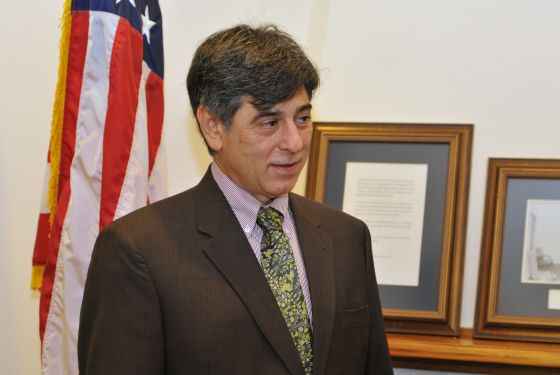
Fidesz or the Hungarian government is often criticized for being arrogant and for modifying rules arbitrarily according to their own interests. We hear similar criticism about the U.S.'s global role. Do you see any similarity? Dominant players on some fields tend to use power instead of negotiation.
We value open discussion and this has been something where we are perhaps a little bit different than other countries in our strong focus on freedom of speech, freedom of expression, trying to ensure all perspectives are heard. In the U.S., we also have the advantage of a divided government. We have a bicameral legislative system with the House and Senate, and we have a separate Executive Branch. So sometimes we're forced to have these discussions because there is a division between the different parties sometimes the President – as will be the case coming up very soon: in January, the President will be from a different political party than both the (majority party in) Senate and the House.
Is it an advantage?
To my mind it is an advantage. It strengthens the need for discussion. Sometimes there will be disagreements, it may be harder to move legislation through, but it also highlights the importance of constructive debate. Not just, “yes, we agree” or “no we don't agree.” We try to see, what are the areas where we could agree and try to move forward, because the states' interests are important to all of us. If we were just one party – if the President, the House and the Senate were all from one party – they didn’t need to talk with anyone else and I think that would be a disadvantage. There would not be a need to have the discussion and therefore you could move forward any piece of legislation that you wanted. We don't have that issue right now in the United States.
Let's talk about some local issues. First, are there still six people on “that list”?
The list hasn’t changed, if you want to call it a list.
Isn't there a daily update?
There is no daily update. We are regularly trying to promote constructive moving forward in working on these common values with regards to accountability, transparency. We don't want to be seen as the policemen of Hungary. This is important to understand. This is not a circumstance where we're trying to tell Hungary- “here’s what you need to do about these corrupt individuals”.
Are you going to tell the Hungarian government who those persons are? Because there is some possibility for exemption under the National Immigration and Nationality Act, saying: “for the purpose of preventing, investigating, or punishing acts that would constitute a crime in the United States” – I suppose, corruption would be included in that – the Secretary of State can give such information based on case by case measuring.
There is a procedure for that. Generally what would be required would be that there be a court case here and a formal process, through which, after a case is established, there is an investigation that actually takes place, and the country wants...
But it's a vicious circle because the government says that they won't take the case to court without grounds for suspicion.
We – that's what I said – the U.S. is not the country that is trying to bring a trial, to have a trial here. We’ve made a decision about who can enter the U.S. That’s what we did. And that's our decision to make. What we’ve said is that Hungarian citizens, Hungarian organizations have presented information to the government of Hungary. That's an internal Hungarian process and it's up to the Hungarian government to review the information its own citizens present to it and to take the appropriate actions. Not to ask the United States to tell it what to do with these specific individuals.
So if the government leads a criminal case, will the Secretary of State possibly give this information?
Now we are starting to get into hypotheticals. But let's say that Hungary took the issue of corruption seriously, that the government actually investigates it, even if it affects its own officials. That it investigates it, that it says we want to have, this information actually merits a court case. So here we are going to have a court case, and we are bringing these specific charges against these individuals and we want to have a trial in which all the information will be presented. If they then say here is this court case, we think that you, the U.S. might have information, which could be helpful in this court case, then we would like to request the information in the case we have established. Then they would go through the appropriate process to ask for that information. We have processes for sharing information in court cases.
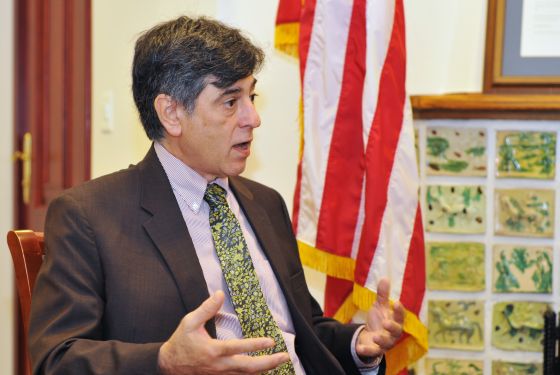
We haven’t seen any precedent using Proclamation 7750 against an EU or NATO member state. Does it mean, according to the United States, that Hungary is the most corrupt country in the EU?
Absolutely not. We don't generally talk about visa matters. We don't publish lists of people who have been excluded (from the U.S.).
So is that a special case that this list became public?
Yes. Someone chose to make it public. Then, after that, there was a lot of speculation and we needed to correct a false story that appeared in the press. And after that – perhaps because people don't talk about these things as openly as they should – or because there is so much suspicion, everybody began to speculate who these people might be. In many places it would be after the government had already taken action against its own officials that we would not let that person into the United States. The U.S. action would be after the other country’s' action. So there are public officials or former public officials in many countries within the EU who are not permitted in the U.S. because their own government found them to be engaged in corrupt activity. The difference here is that this government has not taken that type of action. We took it first. And we didn't tell anyone about it that except for the government. But because perhaps people don't see such actions being taken, there is speculation in the media.
How did the idea come to visit Mr. László Bitó's salon?
The idea came because I was invited. For many places, if it looks like it’s going to be an interesting group of people that I would be interested in talking to...
But did you know that those people had some effect on who will be the challenger of Mr. Orbán or Mr. Tarlós. Their advice did not prove too successful in either case.
That was not a consideration, that was not something that was mentioned to me but even it had been these are the kinds of people that really we should talk to.
Even Mr. Mihály Kornis, who is really not a supporter of the government, published a message on Facebook that read, “Mr. Goodfriend, don't go to Bitó's Salon”.
Let's say that it had been the other way around. If the people who had proposed István Tarlós or proposed Viktor Orbán to run for government had invited me for such a discussion, why would I say no? People who are interested in their society's future, whichever part of the political spectrum they are on, these are the kind of people that really we should be talking to, to understand a little bit of the thinking here in Hungary. If it is people who have interesting ideas, who want to talk about the future of their society, whether they are on what’s called the left or what’s called the right here, it's interesting for me to hear their ideas.
So after all the public reactions to your visit, would you accept another invitation to Mr. Bitó's salon?
Why not?
*
(Photos by Borbála Réti.)